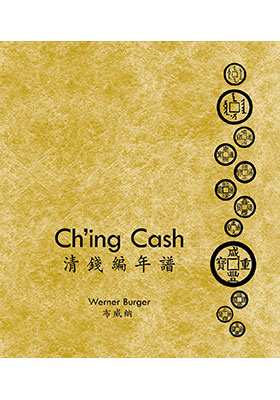Ch′ing Cash
Volume 1—Ch′ing Cash; Volume 2—Ch′ing Cash Year Tables
(清錢編年譜:第一卷—清錢編年譜;第二卷—清錢編年表)
ISBN : 978-988-19023-3-7
Distributed for HKU Museum and Art Gallery 香港大學美術博物館
March 2016
324 pages, 12.875″ x 14.625″, illustrations throughout
- HK$6,000.00
Also Available on
Coins are an accurate gauge of a country’s economic health, as the total number of coins released each year directly relates to an administration’s ability to pay workers and military troops. The study of Ch′ing cash, moreover, necessitates an historical analysis of all mints within China’s macroeconomy from 1644 to 1911.
Werner Burger’s canonical book Ch′ing Cash until 1735 has been the core text in the field for the past 40 years. Burger’s new publication expands on his PhD research to cover the whole of the Ch′ing dynasty. The first volume in the set lists in detail the development of Ch′ing Cash, its manufacture and its many stages from ivory trial pieces to the final product. Over the decades, Burger has developed a novel way for numismatics to present the coins; namely, arranging each coin by individual mint and year produced. This method has led to several unexpected discoveries, such as why during Shun-chih’s reign coins appear with the same character on the top and the right. The second volume contains the rubbings of over 6,000 coins in 53 large foldout charts. Each coin includes a rarity index and an own number. Based on the original research documented in this book, future auction catalogues only will need to list the coin number and its condition for reference.
From Ch′ien-lung onward, the system became so complicated (including two new territories: Sinkiang and Tibet) that information provided from historical records such as the Wen-hsien t′ung-k′ao 文獻通考 was no longer enough to enable the arrangement of coins from the numerous new mints. What was desperately needed were the actual mint reports, but these proved difficult (if not impossible) to track down. If any of the mint reports had survived, they should have been housed in The First Historical Archives of China, inside the Old Palace in Peking. Burger spent years visiting every Ch′ing study address, but with no luck. Finally in 1996, China acknowledged that they had 2,838 mint reports. This information eventually became 60 large bound books in 43,742 pages. Armed with this information, Burger was able to arrange the coins of the remaining 176 years in sequential order according to year. This again resulted in a number of discoveries—all of the old problems that had long puzzled Chinese numismatists could now be solved, such as Manchu mint marks, which previously had not been listed.
In addition, Burger has compiled a list of all coins cast by every mint from 1736 until 1911. Such an accurate statistical breakdown of China’s financial situation during the Ch′ing has allowed Burger to go one step further and divide the total coin production by the total population. His findings corroborate the socio-historical and economic records: during Ch′ien-lung, China cast 16 to 18 new cash coins each year, while T′ung-chih was unable to manage the casting of even one coin per person. Such a detailed study of the money supply of a Far Eastern country in the 18th and 19th century is a vital new source of information for economic historians and Sinologists. Over the course of 50 years of continuous research on Ch′ing cash coins, Burger has acquired ivory, brass, bronze, copper, zinc, lead and iron rare coins, and complete types of official Hsien-feng paper notes and silver sycees. In addition, the current study lists several hundred official and private amulets with Ch′ing reign titles. Burger’s collection is likely the world’s most complete Ch′ing cash collection.
Nearly seven thousand cash coins are reproduced throughout the two volumes, including amulets, forgeries, Tibetan silver coins, Sinkiang gold coins, paper notes and money trees. A descriptive analysis accompanies the high-resolution images, highlighting stylistic deviations that link individual coins to specific mints and reigns.


